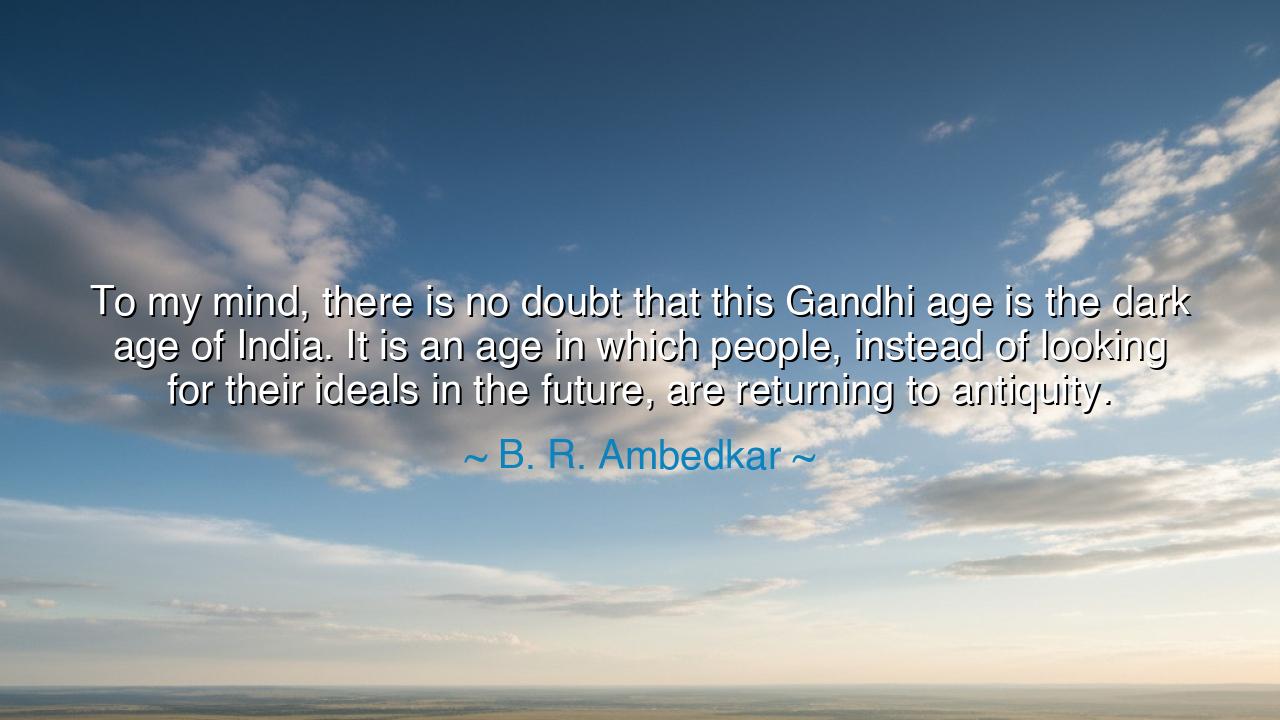
To my mind, there is no doubt that this Gandhi age is the dark
To my mind, there is no doubt that this Gandhi age is the dark age of India. It is an age in which people, instead of looking for their ideals in the future, are returning to antiquity.






Listen, O children of the future, to the words of B. R. Ambedkar, a sage of great vision who spoke with fire about the direction of his time: "To my mind, there is no doubt that this Gandhi age is the dark age of India. It is an age in which people, instead of looking for their ideals in the future, are returning to antiquity." These words, spoken with clarity and conviction, express a deep sorrow for what Ambedkar saw as a backward turn in the nation’s destiny. They speak of an era where the quest for progress was abandoned, where the potential of the future was overshadowed by a nostalgia for the past—an age where tradition was placed above the revolutionary ideals that could have carried India into a new dawn of freedom and prosperity.
In the ancient world, the greatest civilizations rose not by turning back to their origins, but by looking forward—by pushing beyond the constraints of the past into new realms of thought, innovation, and justice. Consider the Greeks, whose philosophers like Socrates, Plato, and Aristotle sought not to recreate the past but to redefine the human experience. They envisioned a future in which reason and philosophy guided society, breaking free from the shackles of old traditions. Likewise, the Romans, though they revered their ancestors, did not simply imitate them but forged new ways of governance, law, and citizenship. It is in this spirit of forward-thinking that civilizations grow, reaching new heights by not living in the shadows of what has passed but by building on the foundation of knowledge and progress.
Yet, in Ambedkar’s eyes, the era of Mahatma Gandhi, though noble in its intentions, began to regress into a longing for the past, for a time that was not necessarily ideal but filled with the illusion of peace and order. Gandhi, revered for his principles of non-violence and self-reliance, sought to return India to a pre-colonial age, where society was structured around traditional values, and the masses lived in harmony with nature and simple ways. But to Ambedkar, this return to antiquity was not a call to renewal, but a retreat from the challenges and opportunities of a new world. Rather than build a nation based on equality, science, and modernity, the focus was placed on recreating a past that had, in many ways, perpetuated the inequalities of caste, untouchability, and oppression.
The tension between these two visions—Gandhi’s reverence for the past and Ambedkar’s call for a progressive future—was not a mere philosophical disagreement but a battle for the soul of a nation. Gandhi’s vision of India was one of spiritual renewal, where truth and non-violence would replace the colonial powers. However, this vision did not extend to social justice in the same way Ambedkar’s did. Ambedkar, a champion for the untouchables and the oppressed, saw in Gandhi’s ideal of a return to antiquity a return to a society where caste and inequality were normalized. Gandhi, though a moral beacon, was blind to the true needs of India's marginalized—those whom Ambedkar would fight for his entire life.
This contrast was not simply about the direction of a political movement, but about the ideals that would define the future of a nation. Ambedkar recognized that to truly free India, it would not be enough to invoke the glories of an ancient, hierarchical society. India’s future could only be built on a foundation of equality, reason, and a complete rethinking of social structures. He saw that clinging to past traditions—no matter how noble—would leave the oppressed people in chains, even in a post-colonial world. As Ambedkar said, the focus must shift away from an idealized past and toward the creation of a future where all Indians were free to flourish—not just those who could trace their ancestry to an idealized golden age.
And so, O children, let the wisdom of Ambedkar guide you: do not live in the shadow of a past that no longer serves the needs of the present. Do not allow nostalgia for simpler times to blind you to the possibilities that the future holds. Just as the ancient Greeks and Romans built upon the wisdom of the past but looked ever forward, so too must you. The world does not move backward; it moves forward, propelled by knowledge, innovation, and justice. To create the future you desire, you must embrace progress and leave behind those outdated ways that hinder **true equality






AAdministratorAdministrator
Welcome, honored guests. Please leave a comment, we will respond soon